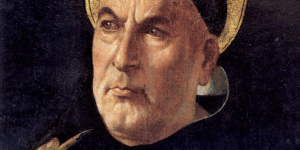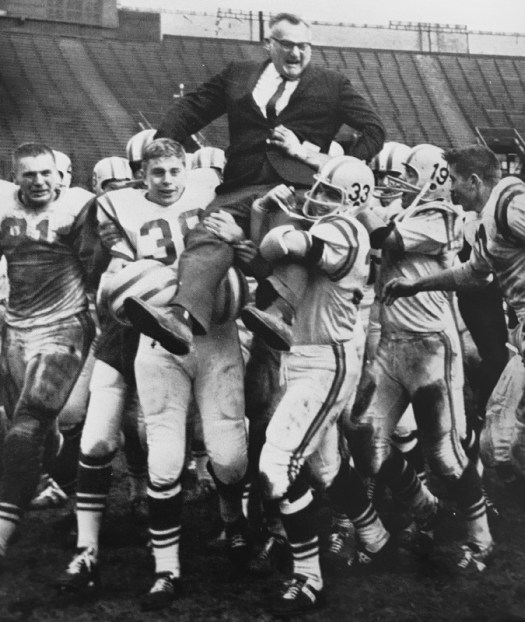WOMEN’S HISTORY MONTH: Female youth football player and Fenwick alumna drew on real-life inspiration to write a best-selling children’s book.
By Laura Enriquez ’08
I learned this lesson at the young age of 11, when I became the first female to play football for St. Mary’s of Riverside. Initially, I wanted to play because I love the sport … and really, who wouldn’t want to take out their pent-up aggression in a channeled way? But what I didn’t understand was, as the first female in the league, playing football became something much bigger.
The first sign of obstacles appeared during sign-ups when the head coach pointed in the direction of the cheerleading table. What he didn’t realize, and what Fenwick would learn during my freshman year, is I would be the worst cheerleader. Just ask anyone present at my poms try-out, when I kicked up too high and fell backwards. Needless to say, I didn’t make it to day two.

I soon learned the pressure of being “the first” at something. While there were many who supported me, there were also others who had more traditional views. These naysayers became vocal in their opposition. There was even an instance when a father approached my mom on the train and criticized her for allowing me to play.
As a female in a male-dominated sport, there were other challenges. Naturally, boys and girls are built differently, but this difference was exacerbated during my experience. For example, it was difficult to find and create appropriate protective equipment. The biggest introspective challenge I faced was how I began to perceive my body. I wanted to be a running back, so I could feel the ball and know the glory of scoring a touchdown. But, I became a lineman who are generally known as the “bigger guys” and equivalent to playing right field in T-ball, or so I thought. And then there were challenges that every athlete faces: balancing friends and sports, getting homework done, and caring for your physical being.
While playing, I worked harder than I’d ever worked before. There were many times I thought about giving up, but I knew I could not. When you are the only female surrounded by males, there’s added pressure to not just do well, but be the best. I accepted this as a challenge and spent the season proving my worth so that my experience could open up doors for other females in the future.
Two-way “iron woman”
During our 2001 season, I played both offensive and defensive line, as well as contributed to special teams. As a captain of the team, I helped lead the Demons to the Chicago Catholic League Championship. And because of my relentlessness and hard work, I ended the season with the most tackles in the league. But the most rewarding accomplishment was what I learned about myself.
When it was time to choose a high school, my mom knew Fenwick was for me. She chose mine and my siblings’ schools based on our personalities, and we’ve attended almost every Catholic school from St. Ignatius to Trinity. Naturally, she thought Fenwick would be a good fit for my competitive nature — and, let’s be honest, all Friars are competitive!
On the first day, we sat in the auditorium and Borsch gave his “look to the left, look to the right” spiel. Seeing as I was sitting next to two very intelligent people, I became worried about what to expect. And in the next four years, I would find that Fenwick had its adversities as well.
The academic rigor was something new for me. Prior to Fenwick, school came easy. It wasn’t until Denise Megall’s Spanish class did I realize how hard I was going to have to work to earn good grades. Also, … most of my classmates were perfectly petite — a mold I didn’t fit. At times, I felt lost and didn’t know how or where I “fit in.”
Thankfully, Fenwick’s educators are heavily invested in their students, which allowed me to create strong relationships with my teachers. In fact, the thing I admire most about Fenwick is its ability to develop not just well-educated, but well-rounded humans.

Fenwick taught me how to interact with people. In Andy Arellano’s speech class, I learned irreplaceable communication skills, like the importance of “hitting the corners” and when to use the KISS method. If you haven’t taken this class yet, my advice is: don’t make tiramisu for your “how to” speech when your Italian classmate is performing the same speech and has samples.
As a Lincoln-Douglas and Public Forum debater, John Paulett and Mary Beth Logas taught me the artistic way to weaponize words. And as a senior, Paulett facilitated my desire to build a larger community outreach program when he helped me found the New Orleans Humanitarian Trip. I am honored to learn that it is still ongoing.
I attribute my passion for literature to Kim Darkes (Kotty), whom I had the pleasure of being one of her first students. She often took time to lend me books and engage in literary conversation outside of class. I even once asked her to grab coffee so we could chat more about literature. In hindsight, I see why my sisters thought (well, think) that was so weird. By the way, I’m still waiting for that cup of “Joe.”
And so, while there were many times I wanted a more familiar path, Fenwick showed me how hard work coupled with support can produce the unthinkable. The passions I developed became the foundation for the journey I embarked on as an adult.
I returned to Fenwick after graduating from Sacred Heart University because Peter Groom was kind enough to allow me to student-teach under Kate Whitman while attending graduate school. I felt compelled to give back to Fenwick (in any way I could) and, thanks to Mike Marresee, I became the head JV softball coach along with Peter Gallo.
Writing a book

In the recent zeitgeist, there has been more encouragement and female involvement in male-dominated sports. I knew my story needed to be told to a larger audience because young women deserve to “see themselves” in every walk of life. After spending several years in the classroom, trying to instill the same values in my students as my teachers instilled in me, I decided to leave teaching to pursue authorship, a big risk. Luckily, Therese Hawkins and Debbie Tracy (Nazareth Academy Principal and President) are fierce supporters and advocates, and gave me their
blessings to do so.
Writing a novel itself is not an easy feat. There’s brainstorming, writing, editing, rewriting … we all know the writing process we tried so hard to short cut in high school. There were many times I wanted to give up. Each time these thoughts crossed my mind, I reflected on why I was doing this to begin with. Inevitably, the thought of quitting was the antithesis of not just my message, but also the values that have been ingrained in me. And so, it is through passion and grit that my novel, Demons, was published in December 2020. It soon became a best-seller on Amazon and has been featured by several sports organizations, including AAU Sports.
Overall, it’s important to examine what skills we have and how we can use them to uplift others, no matter how difficult the journey may be. Afterall, great leaders want more great leaders, and because that’s what Fenwick does: produces go-getters who strive to make the world better.
About the Author

Fenwick alumna Laura Enriquez taught English and was an assistant girls’ softball coach at Nazareth Academy (La Grange Park, IL) from 2017-20. Since publishing her first novel this past December, she has been working on related marketing and speaking engagements. Demons is the No. 1 new release for Children’s Football Books on Amazon and is featured by AAU Sports, SGIS and The Landmark.
READ THE ARTICLE ABOUT DEMONS IN THE RIVERSIDE/BROOKFIELD LANDMARK.
















 Today, Matuszewski serves the community in several ways. His pro-bono activities include work for the
Today, Matuszewski serves the community in several ways. His pro-bono activities include work for the 

 “Lady Bird” won the Golden Globe for Best Film (Musical or Comedy) and is nominated as Best Film at Sunday’s 90
“Lady Bird” won the Golden Globe for Best Film (Musical or Comedy) and is nominated as Best Film at Sunday’s 90 The priests might be a little eccentric, but they are passionate and caring. The director of the high school musical is a Jesuit who has an emotional breakdown when audiences just do not get his interpretation of “Merrily We Roll Along.” His distress is funny when considered in light of the original production’s New York audiences, who were bewildered by Hal Prince’s first staging of the play. After he falls apart, he is replaced as drama director for Shakespeare’s “Tempest” by a priest who is also the JV football coach. The good father is better at designing offensive football plays than he is at directing a play, so the staging is planned in diagrams of X’s and O’s. Still, the coach-priest brings the same commitment and excitement to iambic pentameter as he does to Friday-night lights.
The priests might be a little eccentric, but they are passionate and caring. The director of the high school musical is a Jesuit who has an emotional breakdown when audiences just do not get his interpretation of “Merrily We Roll Along.” His distress is funny when considered in light of the original production’s New York audiences, who were bewildered by Hal Prince’s first staging of the play. After he falls apart, he is replaced as drama director for Shakespeare’s “Tempest” by a priest who is also the JV football coach. The good father is better at designing offensive football plays than he is at directing a play, so the staging is planned in diagrams of X’s and O’s. Still, the coach-priest brings the same commitment and excitement to iambic pentameter as he does to Friday-night lights.




 The article, written on October 10th, stated that, “21 students were hospitalized for alcohol consumption in the fall semester of last year, 20 students have already been hospitalized in the first half of the fall semester this year.”
The article, written on October 10th, stated that, “21 students were hospitalized for alcohol consumption in the fall semester of last year, 20 students have already been hospitalized in the first half of the fall semester this year.”